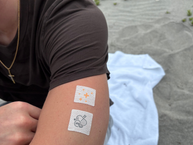Vitamins and some minerals are essential nutrients for life and health, so it’s not surprising that your body may tell you if you are deficient in one or more of them. Even healthy eaters can be low in some nutrients. The signs may be subtle or obvious, and learning what they may be can help clue you in before they become severe or irreversible.
You may need supplements if you are deficient in vitamins, and PatchAid Patches are easy and convenient choices.* Be sure to talk to your healthcare provider about health decisions, including taking supplements.
Anyone Can Be Deficient
Do you think vitamin deficiencies are just for people who don’t take care of themselves? That’s simply not true. There are so many different essential vitamins and minerals that it can be hard to get them all in adequate amounts from your diet alone. Plus, some people have extra risk factors, such as the following.
- Eating a limited diet, such as gluten-free, lactose-free, or plant-based/vegan
- Having fat malabsorption or other malabsorption conditions
- Being an older adult
- Having increased needs, such as due to smoking, being an athlete, or being pregnant
Automatically ruling out a nutrient deficiency if you have signs can make it harder to get over the signs that you have.
Signs That May Show You Are Deficient in Nutrients
These are some common signs of nutrient deficiencies.*
Fatigue
A deficiency of nutrients that are involved with energy production can lead to fatigue. A range of B vitamins, as well as magnesium, copper, zinc, and iron, are all needed for normal energy production.
Brittle nails and changes in skin.
A deficiency of iron is linked to spoon-shaped nails, and healthy skin requires vitamin A, as well as riboflavin, or vitamin B2.
Frequent infections.
Nutrients that are required for normal immune function include vitamins E, C, A, and D, as well as zinc and iron. You might get sick often if you’re deficient.
Excessive bleeding
Vitamin K is needed for normal blood clotting. A deficiency can lead to excessive bleeding of what would otherwise be minor cuts or bruises.
Hair loss
Deficiency of biotin, a B vitamin, or zinc can lead to hair loss.
Muscle aches
Magnesium, calcium, and vitamin D are all essential for healthy muscle function.
Mood swings or depressed mood
Deficiencies of vitamin D, vitamin B12, and vitamin B6 are all linked to changes in mood or a depressed mood. These vitamins are all involved in brain functions.
Trouble seeing
Your eyes depend on vitamin A. A deficiency can lead to impaired night vision and eventually changes in daytime vision as well.
Tingling in the hands or feet
Nerve trouble can indicate a deficiency of vitamin B12. You might notice tingling in your fingers or feet.
Shortness of breath
A lack of adequate oxygen delivery to the cells in your body can lead to having trouble getting enough air, causing shortness of breath. Vitamin B12, folate, and iron are all needed for healthy red blood cell production.
Ways to Tell Whether You Are Deficient in Vitamins
You may be deficient in vitamins if you have risk factors for deficiency or if you have signs. Your doctor may start with a nutritional assessment to see if you are eating a balanced diet. A provider can also order blood tests for many, though not all, vitamins and minerals to check for deficiencies.
What to Do If You Are Deficient in Vitamins
Improving your diet can be a first step for many people who have a mild deficiency, especially if your diet has been lacking. For example, people who never eat fresh fruits and vegetables can up their vitamin C intake by having more, while people who avoid dairy products could incorporate them into their diets.
However, dietary changes may not always be enough to prevent or reverse all deficiencies. That’s because you may need higher amounts of certain vitamins than you can reasonably get from your diet every single day, or you may have factors, such as a malabsorptive disorder, that makes it hard or impossible for you to get enough nutrients from food.
A nutritional supplement may be necessary to stay well nourished. PatchAid Topical Patches are easy to use and they do not require you to swallow any oral supplements, such as tablets, sublinguals, capsules, or gummies. Instead, you can affix a sticky patch to your skin.
The exact patch to use depends on your deficiency or deficiencies. Examples of possible patches include the Multivitamin Plus Patch, a Vitamin D3 Patch, and the Vitamin B12 Energy Plus Patch.
Using a patch and avoiding oral supplements mean the following.
- No chance of indigestion or an upset stomach due to nutrient absorption
- No gluten, soy, sugar, lactose, or other ingredients in oral supplements that you may not want
- No need to check whether to have your vitamins on a full or empty stomach
Just stick on a patch at a time of day that is convenient to you, and go about your business, whether that means sleeping, taking a shower, working out, or going to work. Take off the patch eight hours later, discard it, and repeat the next day.
If you and your provider decide that you need more than one patch, that’s okay. It’s okay to use up to eight PatchAid Patches at a time.
Anyone can develop a deficiency in one or more vitamins and minerals, and many people do. It’s a common situation. If it happens to you, your body may tell you about it, so it is a good idea to learn some of the signs of a deficiency. Then consider a PatchAid Patch for help maintaining normal levels.*
Be sure to ask your healthcare provider if you have any health-related symptoms or if you think you may have a deficiency. Also check to see which PatchAid Vitamins may be right for you.
*The Food and Drug Administration has not evaluated these statements. PatchAid products are not intended to diagnose, treat, cure or prevent any disease. Anyone with a medical condition should seek the advice of a licensed medical practitioner. Individual results may vary.







